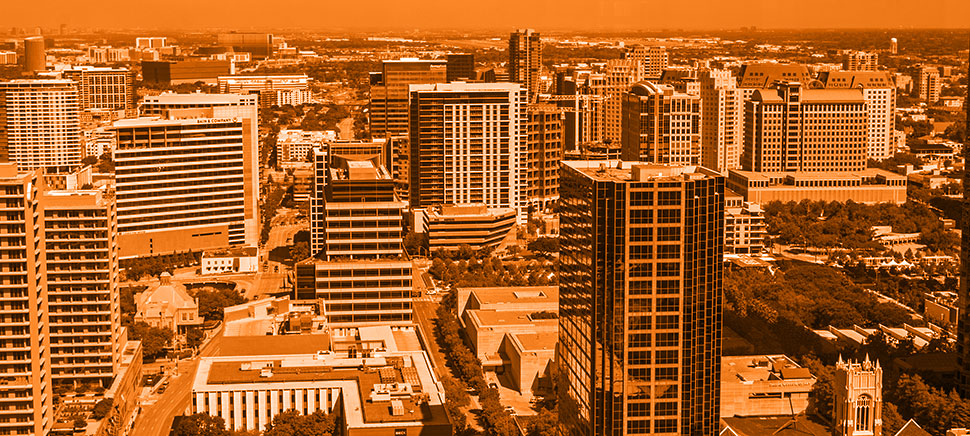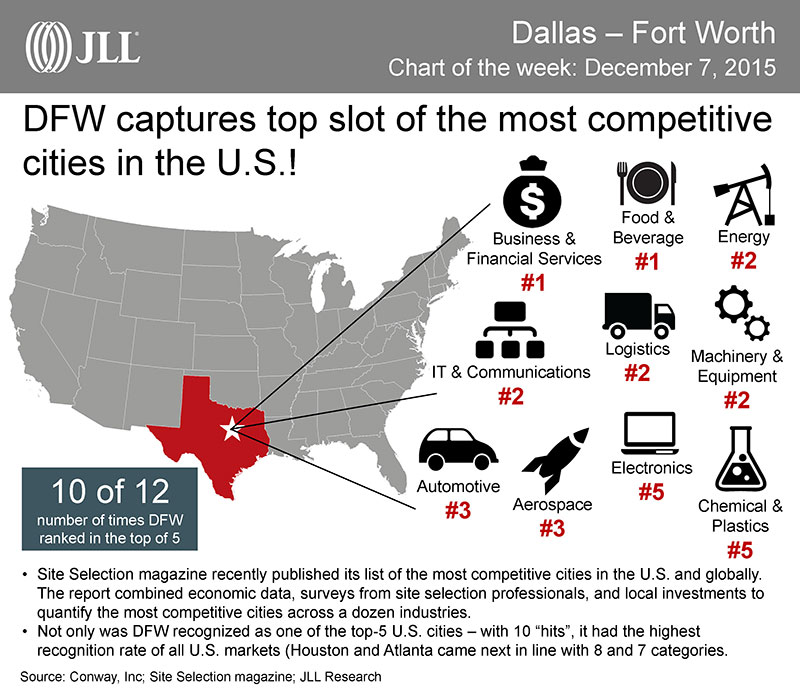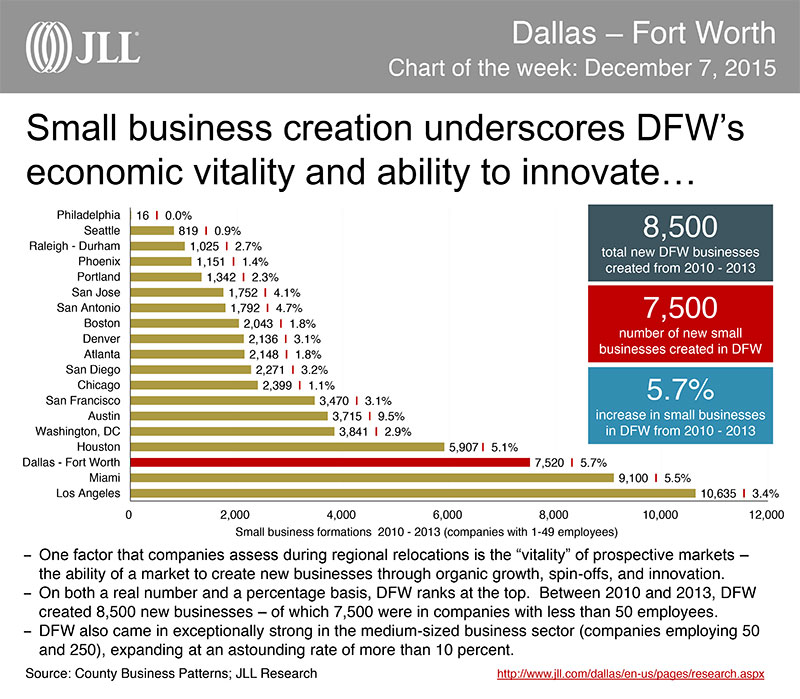Welcome to the content hub for startup news and commentary, featuring topics that range from small businesses and growth-stage business to entrepreneurs and investors. Here’s an overview of where we stand in startup innovation leading into 2016.
When it comes to startups and small business, Dallas Fort-Worth is ripe for a renaissance.
“With the work that is being done across multiple industries and with different thought leaders, I believe that Dallas is witnessing a rebirth of innovation the likes we have never seen,” says Trey Bowles, CEO and cofounder The Dallas Entrepreneur Center.
Dallas created 8,500 new businesses from 2010–2013, 7,500 of which were small businesses with less than 50 employees. That trend has continued, as the Paychex/HIS Small Business Jobs Index recently ranked Dallas the best-performing metro area for small business growth over the past 12 months—a distinction Dallas has regularly received over the past few years.
As for startups, there are roughly 143 for every 100,000 people living in the Big D. And the quantity as well as the quality is expected to grow.
“I believe that Dallas is witnessing a rebirth of innovation the likes we have never seen,” says Trey Bowles.
“Because of the enormous amount of activity that has occurred in the last few years, we have seen an influx of not just startups, but good quality startups,” says Bowles, who is also a cofounder of the Dallas Innovation Alliance, a public-private partnership dedicated to the design and execution of a smart cities plan for the City of Dallas.
The Right Environment for Growth
Home to 21 Fortune 500 companies, DFW is widely and regularly regarded as one of the most business-friendly cities in the United States.
The same environment that is attracting top companies to DFW—a large population, a relatively low cost of living, and the welcomed lack of a state income tax, to name a few—is also producing a booming entrepreneurial ecosystem for new- and growth-stage businesses.
“DFW is a cheap place to operate a business, which frees up capital so it can be invested in technology and people,” says Jake Edsell, chief operating officer of ParkHub, a rapidly growing Dallas-based startup. “D/FW [International Airport] and Love Field are two other huge assets.”
Technology, infrastructure, airports, and limited regulations are big assets, but DFW’s most valuable resource is its people. About 28 percent of the area’s labor force has earned bachelor’s degree or higher, significantly higher than the national average (22 percent), and better than Texas a whole (25 percent).
“DFW is a cheap place to operate a business, which frees up capital so it can be invested in technology and people,” says Jake Edsell.
DFW’s workforce is not just educated. They are entrepreneurial.
There are eight Chambers of Commerce across DFW, and the region has the fifth-highest number of self-employed, and the sixth-largest concentration of high tech workers in the United States.
“Because of the resources that are currently available and that will become available in the future, I get excited about better resourced entrepreneurs, a more robust community of entrepreneurs, mentors, and investors that will exist to take our entrepreneurial ecosystem to the next stage of development,” says Bowles, who in addition to his many other roles, serves as an Adjunct Professor for Entrepreneurship at Southern Methodist University.
A Growing Startup Community
According to the 2015 Kauffman Index: Startup Activity, DFW ranks 15 out of 40 metros for startup activity. The report, commissioned by the Kauffman Foundation, takes into consideration factors such as the “rate of new entrepreneurs,” and “startup density,” or the number of startups per 100,000 people, when researching and ranking cities.
“The number of quality startups has skyrocketed in the last few years,” Bowles says. “The resources for the early stage entrepreneurial community have grown as well.”
Among those resources are organizations like the Dallas Entrepreneur Center (the DEC) and Launch DFW, whose missions are to grow the startup community and help entrepreneurs start, build, and develop businesses.
To underscore just how big Dallas’ startup boom has been, the DEC was founded in 2013, and within three months had 10,000 square feet full of entrepreneurs.
“It was clear at that time that there was a need for organizations like the DEC,” Bowles says.
Today, the DEC has two locations in downtown Dallas, one in Addison, and several more on the way. And in the span of just two years, more than 43,000 entrepreneurs have come through the DEC to benefit from its programs.
“We also love our growing international presence because it means we can give more resources and connections to our graduates,” says Clarisa Lindenmeyer.
Accelerators like Tech Wildcatters, which offer intense mentoring and training to a cohort of startups selected through a highly competitive process, have also expanded across DFW in a significant way. More than a dozen of these programs are graduating new classes of leading startups every year, as they prepare the next generation of innovators in Dallas.
“We attract some mind-blowingly brilliant mentors, investors, partners, and startups from all over the world to come to Dallas and work with us,” says Clarisa Lindenmeyer, Tech Wildcatters’ VP of Corporate Affairs and PR. “We’re founded by and continue to bring in so many amazing local experts and startups into our network, but we also love our growing international presence because it means we can give more resources and connections to our graduates.”
There are also 24 co-working spaces, including The Grove and Foundry Club, which are providing startups affordable office space, and the opportunity to work amongst likeminded entrepreneurs.
As for funding and investment opportunity, “capital follows quality companies,” Bowles says. And as Dallas has produced more quality early stage companies, investment firms have taken note. Currently, 55 investment firms have funded or are funding companies in DFW’s startup scene.
For Bowles, DFW’s booming startup ecosystem is helping “create an international brand for Dallas as a leading hub in entrepreneurship and innovation.”
What’s Ahead
DFW has a simple yet dynamic recipe for small business: one part educated and entrepreneurial people, one part a business friendly environment, stir and support, and then enjoy an economic force to be reckoned with.
“It’s taken DFW the past five years to find its stride and figure out what it wants to be when it grows up. Now we know,” Lindenmeyer says. “We know we want Texas to be a top recognized innovation region in the nation, and we want Dallas to be the center of it all.”
While Dallas’ small business story is reaching a pinnacle, its startup tale has truly just begun.
“We will continue to see the level of talent rise in this community and more people will move to Dallas to be a part of this growing and thriving ecosystem,” Bowles says.
Bowles will soon open additional DEC locations across DFW. The number of startups, accelerators, and investors is also expected to grow.
“It’s taken DFW the past five years to find its stride and figure out what it wants to be when it grows up. Now we know,” Clarisa Lindenmeyer says.
“The DFW startup community is only going to grow and expand. We are going to continue to see more and more aspiring entrepreneurs being willing to have the courage to start new businesses,” Bowles says.
As that happens, DFW will make strides in the national spotlight, beginning to more seriously compete with top-ranked startup cities like Austin, and expanding its role as model for innovation for metros throughout the world.
“There has been a serious transformation in the past five years,” Edsell says. “Once we can really promote and lift up our hometown companies, we begin to compete with the Austins of the world.”
That’s exactly what we at Dallas Innovates plan to do. DFW is on the cusp of a renaissance, and we will be covering its startup and small business scene into their golden ages.
Share your thoughts about the Dallas small business scene and growing startup community in the comments below.
For a daily dose of what’s new and next in Dallas-Fort Worth innovation, subscribe to our Dallas Innovates e-newsletter.


































































